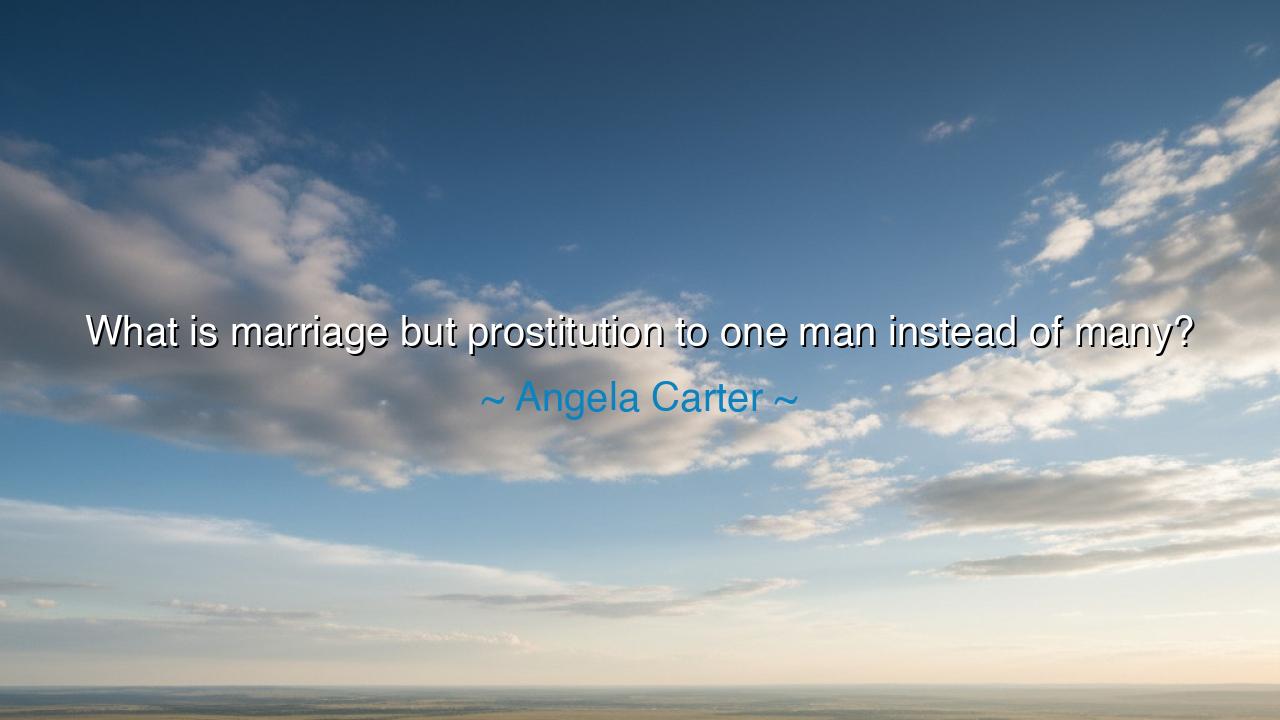
What is marriage but prostitution to one man instead of many?






The words of Angela Carter — “What is marriage but prostitution to one man instead of many?” — strike with the force of rebellion and the fire of awakening. They are not the gentle musings of a romantic, but the fierce cry of a woman who saw through the illusions of her age and dared to name what others only whispered. In this quote, Carter, the English novelist and feminist thinker of the twentieth century, exposes the deep imbalance woven into the traditional institution of marriage. Her words are not an attack on love itself, but a challenge to the structures that have too often enslaved women beneath its name — structures that demanded devotion without freedom, obedience without equality, and sacrifice without reciprocity.
Angela Carter wrote in a time when women were emerging from centuries of silence. In her era, the late twentieth century, the feminist movement was reshaping the world’s understanding of power, gender, and identity. Through her fiction and essays, Carter sought to unmask the myths that had imprisoned women — the fairytales that taught them to find salvation only through a husband’s approval, the moral codes that sanctified their dependence, and the laws that bound their bodies and labor to men. When she calls marriage “prostitution to one man instead of many,” she is not speaking of love’s corruption, but of economic and sexual exchange — of the ancient expectation that a woman’s body, labor, and identity were to be traded for security, social standing, or survival.
Her words pierce with irony. In societies where women were denied education, property, and independence, marriage often became their only path to stability. A woman might marry not for affection, but for protection — not from desire, but from necessity. In this sense, Carter likens the traditional marriage contract to prostitution, for both were built upon a transaction: the giving of oneself, not always freely, in return for sustenance. The difference, she implies, was not moral but practical — that marriage sanctified the exchange under religion and law, while prostitution condemned it. Her provocation is a mirror held to hypocrisy: how can society scorn the woman who sells her body to many, yet glorify the one who must sell it to one man for life?
The ancients themselves, had they listened, would have recognized the truth beneath her outrage. In the days of ancient Rome and Greece, marriage was a contract of power, not a union of equals. Women were exchanged like property between fathers and husbands, their worth measured in dowry and lineage. Love was seldom the foundation of the bond; duty was. Even the noble Penelope, wife of Odysseus, was revered not for passion but for obedience — for waiting faithfully as her life passed by. To Angela Carter, these stories were not ideals to be emulated but warnings — myths that disguised servitude as virtue, and subjugation as destiny.
Consider, then, the story of Nell Gwyn, the 17th-century English actress and mistress of King Charles II. She was born poor, rose from selling oranges in the theatre to captivating the court, and became one of the most famous women in England. Though she was not wed to the King, she wielded wit, charm, and intelligence in a world that denied her legitimacy. Carter might have seen in her a kind of tragic wisdom — that Nell, labeled a prostitute by some, lived more freely than many wives of her time. For in a society that bound women to one man for survival, Nell’s independence, though precarious, was an act of defiance. She refused the false sanctity of a bond that demanded her silence, choosing instead to live on her own terms.
Angela Carter’s wisdom is not a rejection of love, but a call to redefine it. Her words demand that marriage be freed from the chains of ownership and transaction, transformed into a true partnership between equals. When she speaks of prostitution, she points to a world where women’s choices have been shaped by necessity, not freedom — where affection is shadowed by dependence. In her vision, marriage can only be redeemed when it ceases to be a contract of power and becomes instead an act of mutual recognition: two individuals, complete in themselves, choosing to share life not out of need, but out of respect and desire.
And so, my children, take this teaching to heart: love cannot thrive where freedom is denied. Whether in marriage or any bond, beware the illusion of security bought at the price of selfhood. Love that demands submission is not love but control; love that fears equality is not strength but weakness. Let your unions — of heart, of body, of purpose — be built not on transaction, but on truth. A woman should not have to sell her freedom to be cherished, nor a man to purchase affection through dominance.
Thus, the fierce voice of Angela Carter endures as both challenge and prophecy. She tore the veil from the sacred institutions of her time, revealing that justice must enter even the most intimate chambers of human life. Her words urge us to build a world where marriage is not a cage but a covenant, not an exchange but an embrace. Let men and women alike remember this: the highest form of love is not possession, but partnership — where neither is owned, neither is bought, and both are free to stand side by side in the radiant dignity of equality.






AAdministratorAdministrator
Welcome, honored guests. Please leave a comment, we will respond soon